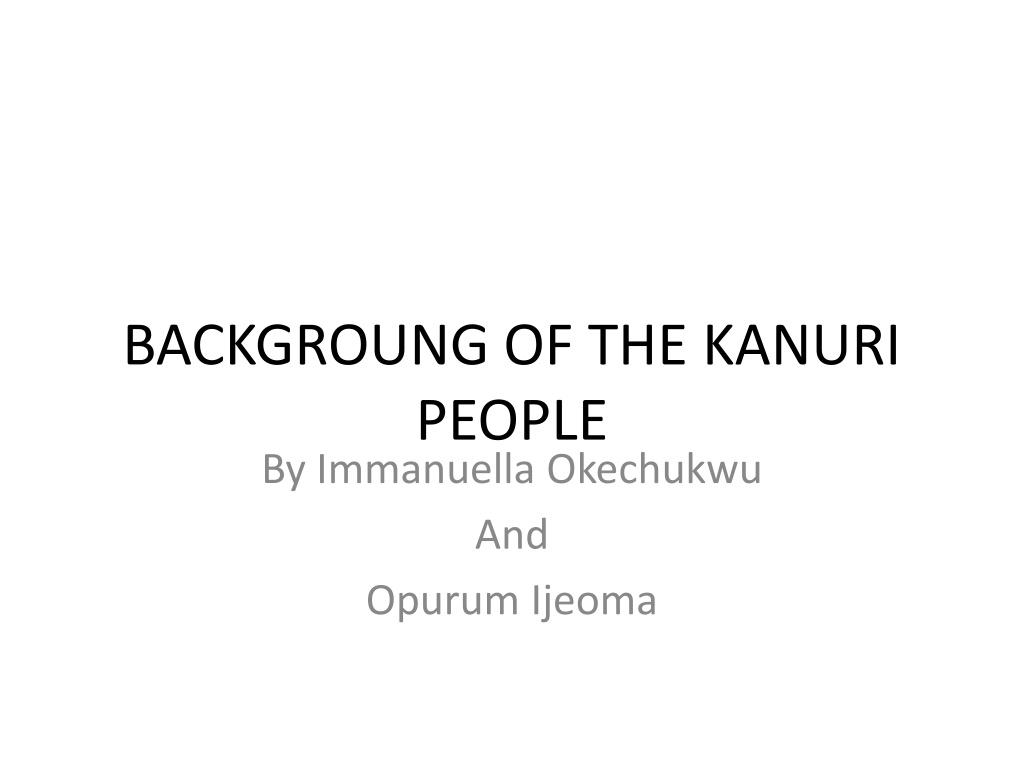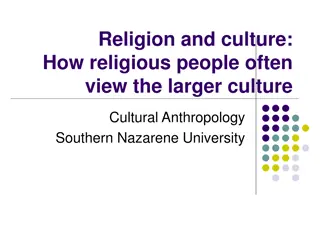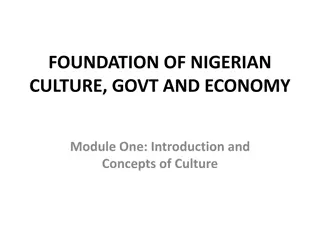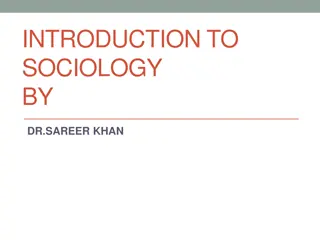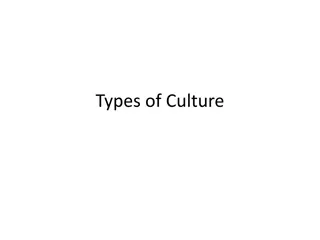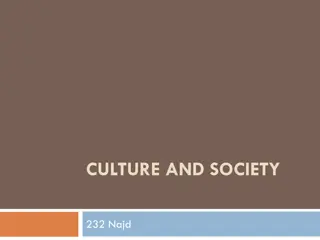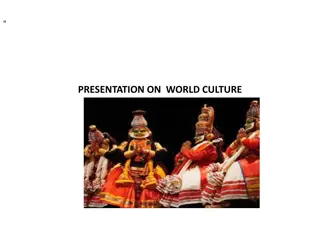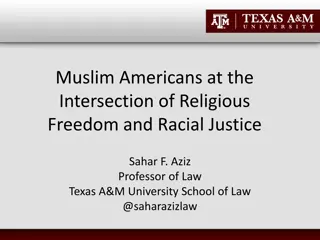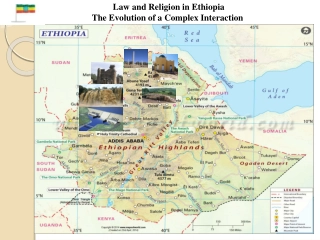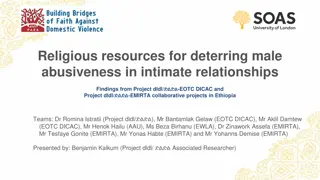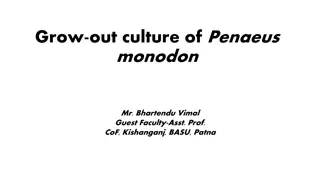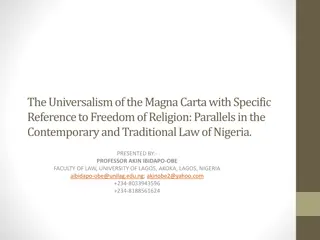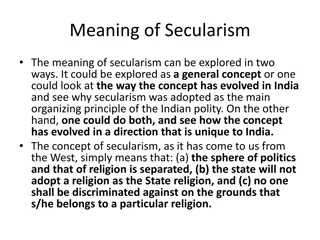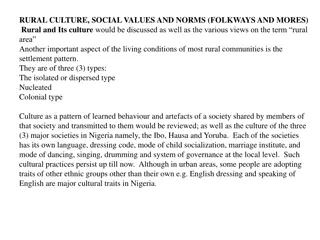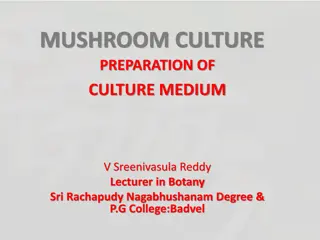Insight into the Kanuri People: History, Culture, and Religion
The Kanuri people, an African ethnic group, primarily inhabit the regions of the former Kanem and Bornu Empires in Niger, Nigeria, and Cameroon. With a rich history dating back to the medieval Kanem-Bornu Empire, they are known for their sedentary lifestyle, farming, fishing, and salt processing traditions. The majority of Kanuri people practice Islam and have cultural practices that are deeply rooted in their heritage. Learn about their language, religion, cultural significance, and marriage customs through this informative piece.
Download Presentation

Please find below an Image/Link to download the presentation.
The content on the website is provided AS IS for your information and personal use only. It may not be sold, licensed, or shared on other websites without obtaining consent from the author. Download presentation by click this link. If you encounter any issues during the download, it is possible that the publisher has removed the file from their server.
E N D
Presentation Transcript
BACKGROUNG OF THE KANURI PEOPLE By Immanuella Okechukwu And Opurum Ijeoma
The Kanuri people(Kanuri, Kanowri, Yewa and other several subgroup names) are an African ethnic group living largely in the land of the former Kanem and Bornu Empires in Niger, Nigeria and Cameroon. They trace their origins to ruling lineages of the medieval Kanem- Bornu Empire, its closest to Toubou or Zaghawa. Traditionally been sedentary, engaging in farming, fishing the Chad Basin and salt processing. TOTAL POPULATION= 10 MILLION(2013 estimate) NIGERIA= 6,890,00 92013 ESTIMATE) does not include Mangari CHAD=1, 000, 000(2013 ESTIMATE) most of which are Kanembu subgroup NIGER= 850,000(2013 ESTIMATE) includes Mangari, Tumari which is about 40,000 subgroup members. Cameroon= 56,000 (1982 estimate)
LANGUAGES= Kanuri Language Religion= Islam Related Ethnic groups include; Kanembu people, Zaghawa, Hausa, Baggare. The largest population of Kanuri reside on the north east of Nigeria, where the ceremonial Emirate of Bornu traces direct descdent from the Kanem-Bornu empire, founded before 1000CE. Some 3 million Kanuri speakers live in Nigeria, not including the some 200, 00 speakers of the Manga/Mangari dialect. They are commonly called Beri Beri which is an Hausa name. The 400,000 Kanuri population in Niger includes the Mangari subgroup numbering upto 100,000 in the area of east Zinder. Originally a pastoral group, the Kanuris were one of the many Nilo- Sahara groups indigenous to the central south Sahara, thus beginning their expansion in the area of Lake Chad in the 7th century. Originally a pastoral people ,the Kanuri people were one of the Nilo-Sahara groups indigenous to the central south Sahara , thus beginning their expansion in the area of Lake Chad in the late 7th century. According to Kanuris, Sef son pf Dhu Ifazan of Yemen arrived in Kanem in 9th century.
RELIGION The Kanuris became Muslim in the 11th century. Kanem became a center of Muslim learning and the Kanuri soon controlled all the area surrounding Lake Chad and a powerful empire called Kanem Empire, which reached its height in the 16th and 17th centuries when they ruled much of MIDDLE AFRICA.
KANURI CULTURE The Kanuri people can be said without doubt to be the most respected people in the Northern part of Nigeria. They value well their culture. Kanuri women are distinctively superb when it comes to caring . Their hairstyle and tattoo which is known as lallle in hausa language can only be described as epic. Chiefly, a kanuri man prides himslef high and this makes him despised by other Northerners. They rarely beg. From the sweat of their brows they source their bread. In addition, the Kanuri dance steps are gracious and wonderful. They resemble the magnificent colours of their attires. KANURI MARRIAGE The Kanuri marriage rites are very simple and in accordance with Islamic injunctions to express love between the couple. Reverence for the waliyyi , the giver who could be her father or guardian is expressed. Observance of sadau which is the dowry; sigga which is the act of asking ana accepting between the family of the bride and groom and their witnesses. And the minimum dowry in Kanuri marriage is a quarter of a dinar. Furthermore, when the Kanuri groom s family comes with gifts to the bride-to-be, they come along with items for the bride s mother, aunts, uncles, sisters etc.
In addition, when the Kanuri bride is leaving for her husbands house, things like the foam from the water used to wash her hair, the kaulu which is used in washing of the hand and feet with palm oil and milk, will all be paid for by the groom s friends. Its important to realize all these aim at showing the love and value for the bride. KANURI FOOD The main food of the Kanuri people is millet in soups or rice, and corn. They also involve in little hunting activities for the purpose of hunting does, which is meat. They herd cattle for beef, they also harvest leaves and fruits to eat. Indeed, the simplicity and unique lifestyle of the Kanuri is a sophisticated one, it shows to the world how advanced they are inwardly. In conclusion, give admiration to a Kanuri however life may present him/her; for in truth they are sons and daughters of royalty.
